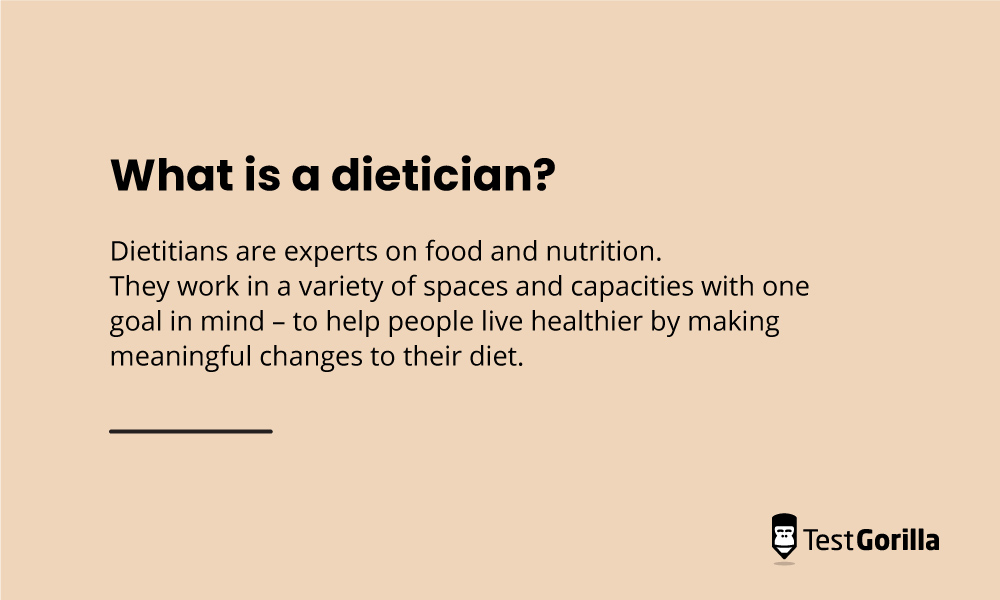All Categories
Featured
Table of Contents
-1
In the USA and many other countries, a dietitian is a board-certified food and nutrition professional. They are extremely educated in the field of nourishment and dietetics the scientific research of food, nourishment, and their influence on human health. Via extensive training, dietitians acquire the know-how to give evidence-based clinical nourishment therapy and nutritional therapy customized to fulfill an individual's demands.
-1To earn these credentials dietitians-to-be need to initially gain a bachelor's degree or comparable debts from a certified program at a college or college. Usually, this requires an undergraduate scientific research degree, including courses in biology, microbiology, organic and inorganic chemistry, biochemistry and biology, composition, and physiology, as well as even more specialized nutrition coursework.
Postpartum Dietitian
-1This allows them to examine intense demands, focusing on lethal problems. Inpatient and outpatient dietitians likewise provide nourishment education to individuals with specialized needs, such as those recently out of surgical procedure, in cancer treatment, or diagnosed with persistent diseases like diabetic issues or kidney illness. In the outpatient setup, they provide a lot more thorough dietary counseling working in the direction of a nutrition-oriented goal.
-1Study dietitians generally function in research study healthcare facilities, organizations, or colleges. As soon as dietitians have actually gained their qualifications and are functioning in the field, they can go on to specialize in a particular subcategory, such as pediatric medicines or sports dietetics.
-1They might additionally teach in an academic or research study establishment or discuss nutrition-related subjects. Others might function as health and wellness and nutrition specialists in media or as speakers. Dietitians are qualified to handle nutrition treatment across a period of severe and persistent problems. The kind of conditions they deal with depends most on the setting of their method.
Personal Trainer Nutritionist
-1In many states, such as Alaska, Florida, Illinois, Maryland, Massachusetts, and Pennsylvania, RDs and CNSs are granted the very same state license, usually called a Qualified Dietitian Nutritional Expert (LDN) license. In states that don't control making use of this term, anyone with a passion in diet regimen or nourishment might call themselves a nutritional expert.
-1Nevertheless, because uncredentialed nutritionists generally lack the competence and training for medical nutrition therapy and nutrition therapy, following their guidance might be taken into consideration harmful (). Prior to consulting a nutritionist, you may intend to check whether your state manages that may utilize this title. In the U.S. states that do not regulate the term, no levels or qualifications are called for to be a nutritional expert.

-1
In states that do mandate licensure, the CNS or RD credential might required. Those with CNS credentials are wellness experts like nurses or doctors with advanced wellness degrees that have actually chosen added coursework, completed supervised practice hours, and passed an examination supervised by the Board for Qualification of Nutrition Specialists.
-1While some of these approaches may have robust clinical backing, others may not. Providing nourishment suggestions without the correct understanding and training can be dangerous, specifically when counseling those with wellness conditions. Therefore, if you are thinking about consulting a nutritionist, you may want to ask if they are a CNS or have state licensure or qualification, or one more credential.
Best Dietitian For Pregnancy – Madora Bay
-1Numerous states particularly manage this term. Furthermore, nutritionists might seek a sophisticated CNS qualification.
-1It can be challenging to aid people make genuine, long lasting modifications in their lives. Both dietitians and nutritional experts supply a variety of nutrition-based services to customers.
-1They must have finished some degree of education in their field. They are also called for to have actually finished as much as a year of supervised job, working within a guided program at a health care center, providing organization, or community body. Dietitians have much higher assumptions put on their capacities and level of expertise.
-1This implies that there is no body that oversees their qualifications and no specifically rigorous standards that nutritionists requirement to follow in order to be able to practice. Dietitians, on the various other hand, are registered with nationally acknowledged bodies, such as the Dietitians Organization of Australia. They need to follow the National Competency Specifications for Dietitians.
Professional Dietitian ( Mandurah)

-1
You can exercise as a nutritionist without the exact same degree of certification as a dietitian. Nutritional expert training courses can vary in size and top quality, with some as brief as 6 weeks and covering far much less content than a dietetics course. Relying on your education and learning supplier, you can gain a considerable amount of understanding with examining a basic nutrition course; nonetheless it is very important to explore the course content prior to beginning.
-1This can include attending market seminars or checking out market magazines. Nutritionists, on the various other hand, typically make their certifications in order to supplement various other credentials and offer better suggestions to their customers. Nutritionists can gain employment in a broad array of fields, consisting of public wellness guidance, suggestions for individuals, and functioning with private organisations.
-1Nutritional experts can work with showing off organisations, health clubs, institutions and recommend media outlets on standard terminology and correct usage of terms. Dietitians can function in many of the same functions as nutritional experts.
Weight Loss Dietitian
-1Dietitians typically collaborate with more medically delicate customers. These can consist of those with diabetic issues, allergic reactions, excessive weight, cancer and gastrointestinal diseases. Due to the high level of expertise required to give solutions to these individuals, just approved dietitians are allowed to supply treatment. A few of the greater level functions with healthcare institutions can be really rewarding, and pay fairly well.
-1In Australia there is a difference in between a dietitian and other dietary health service providers including nutritional experts. All dietitians are nutritionists, yet nutritional experts without a dietetics credentials can't call themselves a dietitian.
-1Dietitians with the Accredited Practising Dietitian (APD) credential commit to continuous training and education throughout their careers. They comply with our standard procedure. Dietitians have the knowledge and abilities located in the National Competency Standards for Dietitians. As a profession, nutritionists are not managed in Australia under NASRHP or certified under a solitary regulatory body.
Diabetes Nutrition Management – Madora Bay
-1If you have a persistent health condition and a care plan from your GP, you might have the ability to assert a Medicare discount when you see an APD. Find out more about assistance with prices when seeing a dietitian. The major objective of people operating in the occupation of dietetics is embodied in this statement: The profession of dietetics adds to the promotion of health and wellness and the prevention and therapy of health problem by optimizing the nourishment of populations, areas and individuals.
Table of Contents
Latest Posts
Dietwise.net.au - Children
Resources - Dietwise.net.au – Kiara
Cindy Tran
More
Latest Posts
Dietwise.net.au - Children
Resources - Dietwise.net.au – Kiara
Cindy Tran